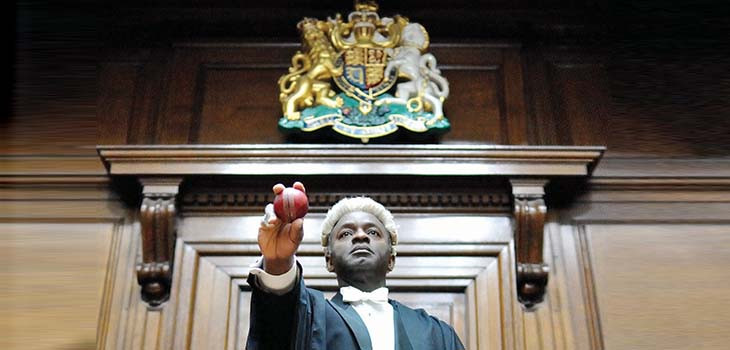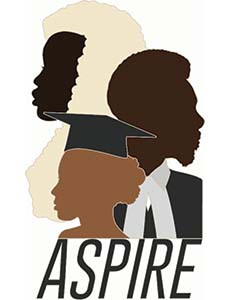*/

‘How do you say your name?’
‘Olatunji Sowande, Sir... Or lah toon gee Show wahn day.’
‘That’s a rather difficult name to pronounce, isn’t it? Why don’t you use a good English name like the West Indians do?’
‘But that’s my name, sir. It’s the name I was christened with. I … ’
‘How are my clients supposed to react when I tell them I’m sending a junior along with a brief, and that he is called Mr Toomba Toomba Shomba Goomba? They’ll know I’m sending an African, will they not? What wil l that say about us, huh?’
Pupil recruitment practice may have improved since this example in the 1950s but the challenge to increase diversity in our profession remains. Fortunately, Tunji Sowande’s unsettling first encounter with chambers did not foreshadow the journey that saw him appointed Britain’s first Black judge in 1978.
On 17 October 2022, ASPIRE will host a performance of Just an Ordinary Lawyer, written and performed by Tayo Aluko, at Birmingham’s Repertory Theatre. The play charts Sowande’s life from his birth in Nigeria, arrival in England in 1945, call to the Bar at Lincoln’s Inn in 1952 to tenancy at 3 King’s Bench Walk. It takes us through his career at the Criminal Bar, conducting important cases at the Old Bailey and beyond, culminating in his appointment as head of chambers and Deputy Circuit Judge.
He never attained silk but selflessly gave his support to many who followed him, including a young Kim Hollis who went on to become a prominent Asian silk. He had a lifelong love of cricket and jazz, and a boundless, generous personality.
Just an Ordinary Lawyer is a moving retrospective of an extraordinary life lived through extraordinary times. Sowande encountered much prejudice and discrimination and made significant personal sacrifice. But his story serves to inspire.
ASPIRE is an affiliation of partner organisations with a joint mission to improve the visibility and advancement of Black lawyers, aiming to make their presence an ever-increasing norm.
Black people face numerous challenges in seeking to break into and progress through the profession. Low numbers apply because of a perception that it is a club for their white, male counterparts. Those who do manage to join often operate on its fringes and have high attrition rates. Many leave owing to the expense of the Bar course, high living costs (especially in London) and the savage cuts to publicly funded cases.
Of those who do remain, few become silks or judges. Recent research reveals that there have been around 2,000 applications for KC in the past decade. Of that number, half were appointed. Just 200-odd of those 2,000 were applications by members of the Black and minority communities. Drilling down further, only 1.2% of the 200 were Black. Research has revealed that recommendation rates for applications for judicial office were 73% lower for Black candidates when compared to white candidates. Much needs to be done to tackle these problems.
The event begins with a networking reception to facilitate a range of connections: young students with young lawyers, practitioners gaining insights from senior members of the profession. Significantly, members of the judiciary will attend to better understand the challenges faced and to encourage applications for judicial office. Judges, barristers, solicitors and students will mix in a friendly, convivial setting, striking up relationships that may lead on to work experience and judicial shadowing. After the performance, there will be a Q&A session, and the networking will continue.
ASPIRE encourages barristers of all backgrounds to attend to see Sowande’s story and help those seeking to join and progress through our hallowed profession.

ASPIRE is an affiliation of partner organisations with a joint mission to make the presence of Black lawyers an ever-increasing norm.
Pictured top: At Birmingham’s Repertory Theatre on 17 October 2022, ASPIRE – in conjunction with No5 Chambers and Birmingham Law Society – hosted a performance of Just an Ordinary Lawyer, the story of Tunji Sowande (1912-1996) written and performed by Tayo Aluko

‘How do you say your name?’
‘Olatunji Sowande, Sir... Or lah toon gee Show wahn day.’
‘That’s a rather difficult name to pronounce, isn’t it? Why don’t you use a good English name like the West Indians do?’
‘But that’s my name, sir. It’s the name I was christened with. I … ’
‘How are my clients supposed to react when I tell them I’m sending a junior along with a brief, and that he is called Mr Toomba Toomba Shomba Goomba? They’ll know I’m sending an African, will they not? What wil l that say about us, huh?’
Pupil recruitment practice may have improved since this example in the 1950s but the challenge to increase diversity in our profession remains. Fortunately, Tunji Sowande’s unsettling first encounter with chambers did not foreshadow the journey that saw him appointed Britain’s first Black judge in 1978.
On 17 October 2022, ASPIRE will host a performance of Just an Ordinary Lawyer, written and performed by Tayo Aluko, at Birmingham’s Repertory Theatre. The play charts Sowande’s life from his birth in Nigeria, arrival in England in 1945, call to the Bar at Lincoln’s Inn in 1952 to tenancy at 3 King’s Bench Walk. It takes us through his career at the Criminal Bar, conducting important cases at the Old Bailey and beyond, culminating in his appointment as head of chambers and Deputy Circuit Judge.
He never attained silk but selflessly gave his support to many who followed him, including a young Kim Hollis who went on to become a prominent Asian silk. He had a lifelong love of cricket and jazz, and a boundless, generous personality.
Just an Ordinary Lawyer is a moving retrospective of an extraordinary life lived through extraordinary times. Sowande encountered much prejudice and discrimination and made significant personal sacrifice. But his story serves to inspire.
ASPIRE is an affiliation of partner organisations with a joint mission to improve the visibility and advancement of Black lawyers, aiming to make their presence an ever-increasing norm.
Black people face numerous challenges in seeking to break into and progress through the profession. Low numbers apply because of a perception that it is a club for their white, male counterparts. Those who do manage to join often operate on its fringes and have high attrition rates. Many leave owing to the expense of the Bar course, high living costs (especially in London) and the savage cuts to publicly funded cases.
Of those who do remain, few become silks or judges. Recent research reveals that there have been around 2,000 applications for KC in the past decade. Of that number, half were appointed. Just 200-odd of those 2,000 were applications by members of the Black and minority communities. Drilling down further, only 1.2% of the 200 were Black. Research has revealed that recommendation rates for applications for judicial office were 73% lower for Black candidates when compared to white candidates. Much needs to be done to tackle these problems.
The event begins with a networking reception to facilitate a range of connections: young students with young lawyers, practitioners gaining insights from senior members of the profession. Significantly, members of the judiciary will attend to better understand the challenges faced and to encourage applications for judicial office. Judges, barristers, solicitors and students will mix in a friendly, convivial setting, striking up relationships that may lead on to work experience and judicial shadowing. After the performance, there will be a Q&A session, and the networking will continue.
ASPIRE encourages barristers of all backgrounds to attend to see Sowande’s story and help those seeking to join and progress through our hallowed profession.

ASPIRE is an affiliation of partner organisations with a joint mission to make the presence of Black lawyers an ever-increasing norm.
Pictured top: At Birmingham’s Repertory Theatre on 17 October 2022, ASPIRE – in conjunction with No5 Chambers and Birmingham Law Society – hosted a performance of Just an Ordinary Lawyer, the story of Tunji Sowande (1912-1996) written and performed by Tayo Aluko


The Bar Council is ready to support a turn to the efficiencies that will make a difference
By Louise Crush of Westgate Wealth Management
Marie Law, Director of Toxicology at AlphaBiolabs, examines the latest ONS data on drug misuse and its implications for toxicology testing in family law cases
An interview with Rob Wagg, CEO of New Park Court Chambers
What meaningful steps can you take in 2026 to advance your legal career? asks Thomas Cowan of St Pauls Chambers
Marie Law, Director of Toxicology at AlphaBiolabs, explains why drugs may appear in test results, despite the donor denying use of them
Ever wondered what a pupillage is like at the CPS? This Q and A provides an insight into the training, experience and next steps
The appointments of 96 new King’s Counsel (also known as silk) are announced today
Ready for the new way to do tax returns? David Southern KC continues his series explaining the impact on barristers. In part 2, a worked example shows the specific practicalities of adapting to the new system
Resolution of the criminal justice crisis does not lie in reheating old ideas that have been roundly rejected before, say Ed Vickers KC, Faras Baloch and Katie Bacon
With pupillage application season under way, Laura Wright reflects on her route to ‘tech barrister’ and offers advice for those aiming at a career at the Bar